七下 Unit 11 How was your school trip? 单元复习课件(25张PPT)
文档属性
| 名称 | 七下 Unit 11 How was your school trip? 单元复习课件(25张PPT) | 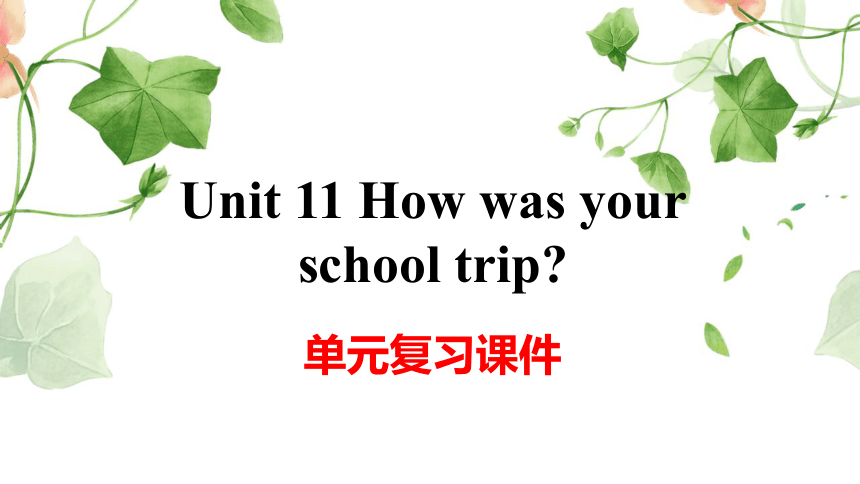 | |
| 格式 | pptx | ||
| 文件大小 | 855.3KB | ||
| 资源类型 | 教案 | ||
| 版本资源 | 人教新目标(Go for it)版 | ||
| 科目 | 英语 | ||
| 更新时间 | 2023-06-05 11:27:11 | ||
图片预览

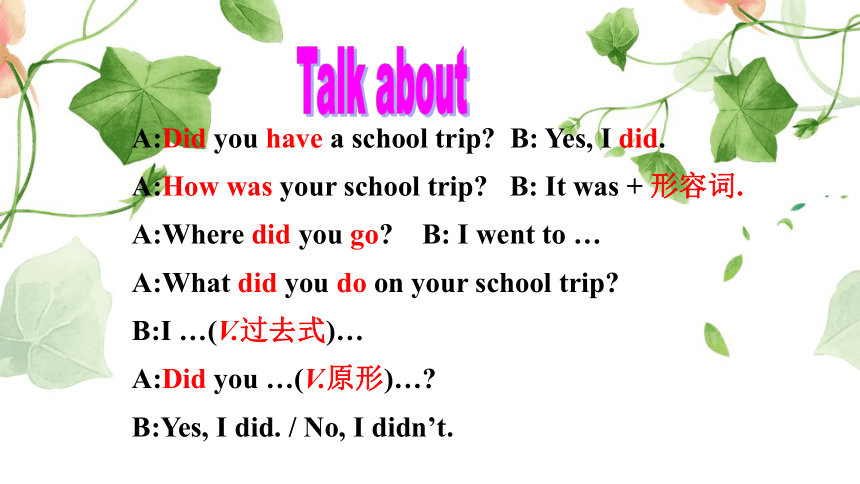
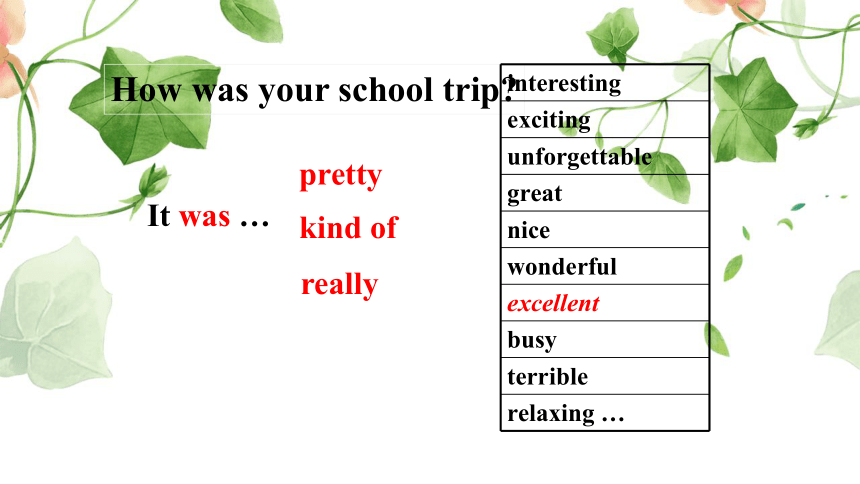
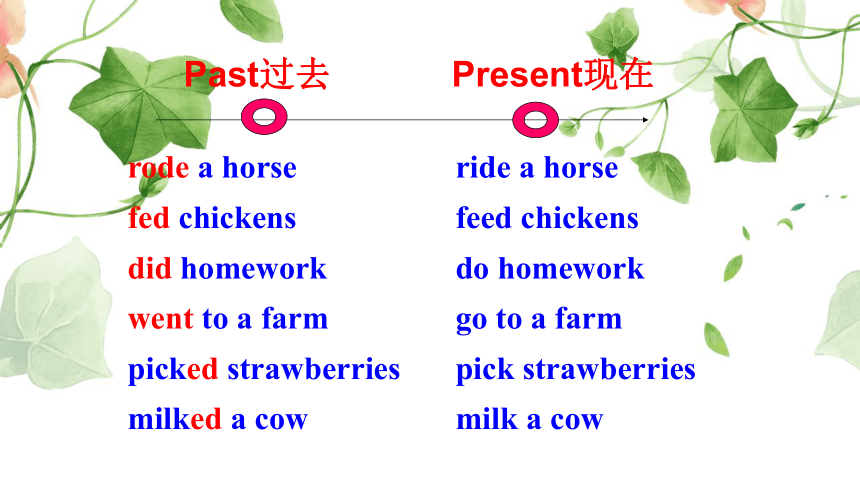
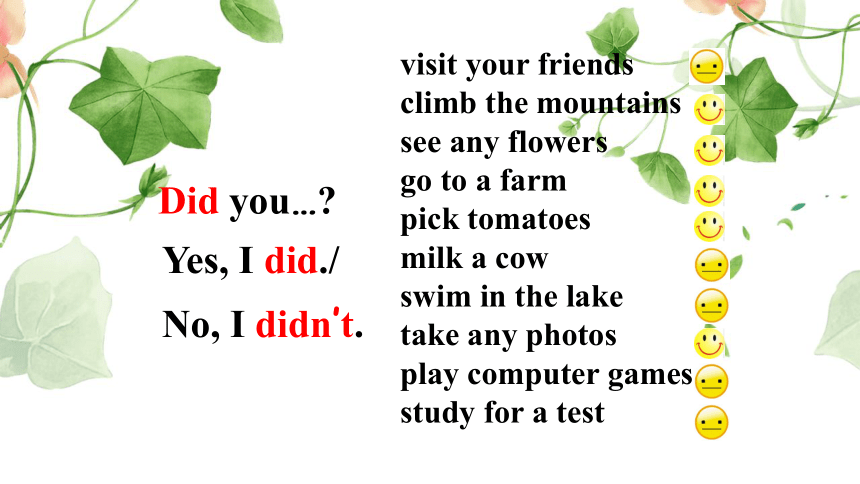
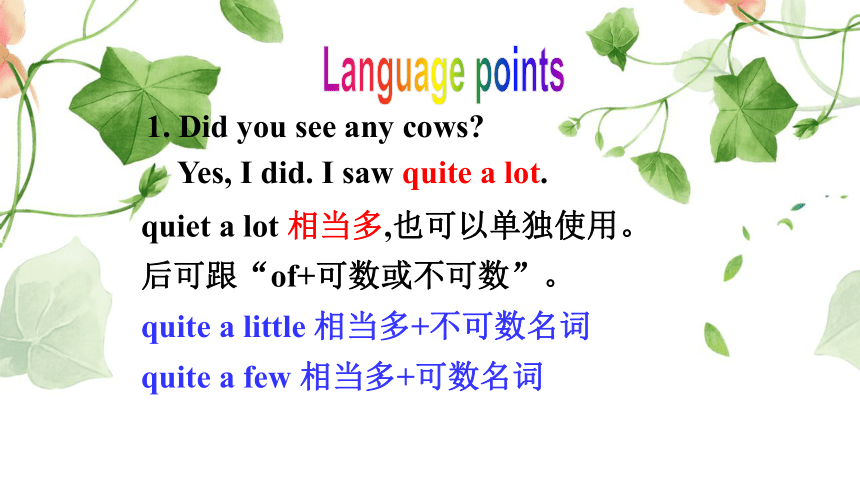
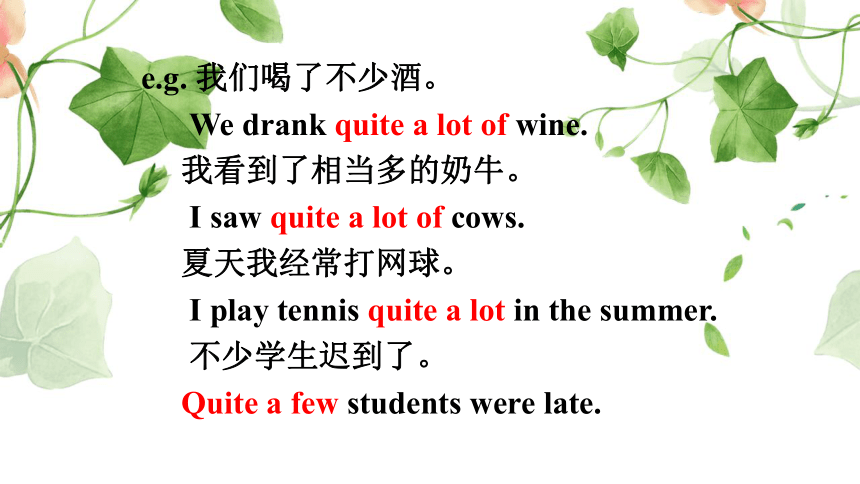
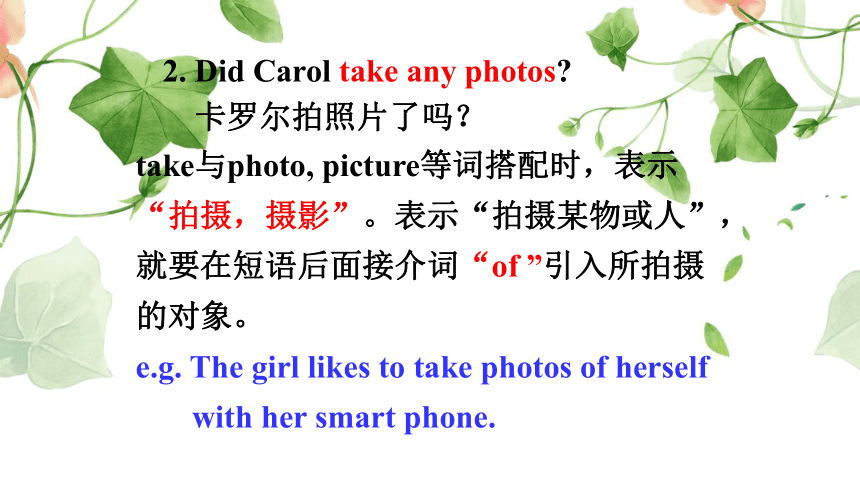
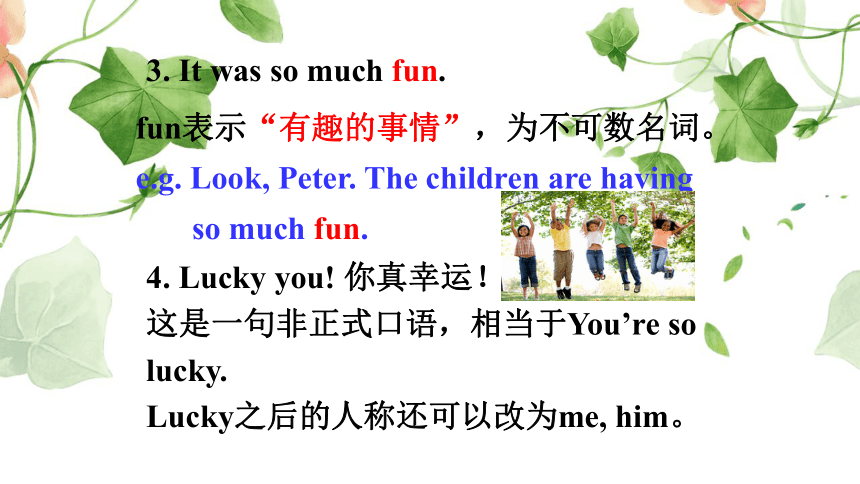
文档简介
(共25张PPT)
单元复习课件
Unit 11 How was your school trip
A:Did you have a school trip B: Yes, I did.
A:How was your school trip B: It was + 形容词.
A:Where did you go B: I went to …
A:What did you do on your school trip
B:I …(V.过去式)…
A:Did you …(V.原形)…
B:Yes, I did. / No, I didn’t.
Talk about
How was your school trip
It was …
interesting
exciting
unforgettable
great
nice
wonderful
excellent
busy
terrible
relaxing …
pretty
really
kind of
Past过去
Present现在
ride a horse
feed chickens
do homework
go to a farm
pick strawberries
milk a cow
rode a horse
fed chickens
did homework
went to a farm
picked strawberries
milked a cow
Did you…
visit your friends
climb the mountains
see any flowers
go to a farm
pick tomatoes
milk a cow
swim in the lake
take any photos
play computer games
study for a test
Yes, I did./
No, I didn’t.
quiet a lot 相当多,也可以单独使用。
后可跟“of+可数或不可数”。
quite a little 相当多+不可数名词
quite a few 相当多+可数名词
1. Did you see any cows
Yes, I did. I saw quite a lot.
Language points
e.g. 我们喝了不少酒。
We drank quite a lot of wine.
我看到了相当多的奶牛。
I saw quite a lot of cows.
夏天我经常打网球。
I play tennis quite a lot in the summer.
不少学生迟到了。
Quite a few students were late.
take与photo, picture等词搭配时,表示“拍摄,摄影”。表示“拍摄某物或人”,就要在短语后面接介词“of ”引入所拍摄的对象。
e.g. The girl likes to take photos of herself
with her smart phone.
2. Did Carol take any photos
卡罗尔拍照片了吗?
fun表示“有趣的事情”,为不可数名词。
e.g. Look, Peter. The children are having
so much fun.
3. It was so much fun.
4. Lucky you! 你真幸运!
这是一句非正式口语,相当于You’re so lucky.
Lucky之后的人称还可以改为me, him。
4. All in all, it was an exciting day.
总之,这是令人兴奋的一天。
all in all 总的说来;总之;整体上说
例如:总的说来,我认为你干得很好。
All in all, I think you did a good job.
5. Everything was about robots and I’m not interested in that.
每个东西都是关于机器人的,我对此不感兴趣。
be interested in 对……感兴趣
例如:我们对英语感兴趣。
We are interested in English.
辨析:interested/interesting
interested
人对事物感兴趣
事物本身
有趣
interesting
用于句型be(become)
interested in
可作定语和表语
用interesting / interested 填空。
1. The book is very _________. Most of the teachers are _________in it.
2. The boy has much _________ in drawing.
3. 3岁的时候,他开始对音乐产生了兴趣。
He ______ _________ _______music when he was 3 years old.
interesting
interested
interested
was interested in
我对收集邮票很感兴趣。
I am interested in collecting stamps.
那是一本很有意思的书,你一定要读读。
That is an interesting book,you must read it.
辨析:interested/interesting
6. I didn’t like the trip at all.
我一点都不喜欢这次行程。
not at all / not… at all 根本不;完全不
I don’t like mutton at all.
我一点都不喜欢羊肉。
She’s not at all good at badminton.
她完全不擅长打羽毛球。
一般过去时
一般过去时可以表示过去某一时间或某一段时间发生的动作或存在的状态。
我昨天在农场摘了苹果。
I picked some apples on the
farm yesterday.
I pick some apples on the farm on weekends.
我周末在农场摘苹果。
你知道下列单词的过去时吗
milk
is
do
go
live
study
taste
stop
walk
dance
milked
was
walked
did
went
danced
stopped
lived
studied
tasted
你发现什么规律了吗
The rules of the past form
1
played worked wanted needed
2
decided lived improved
3
carry—carried study—studied
worry—worried
4
stop—stopped shop—shopped
plan—planned
动词过去时的变化规则:
1.一般情况下,在动词原形末尾加-ed;
2. 结尾是字母-e 的动词加-d;
3.结尾是“辅音字母+y” 的动词,变y为i 再加-ed;
4.重读闭音节结尾,双写动词尾辅音字母再加-ed。
5
动词的不规则变化:
go—went have—had see—saw
eat—ate buy—bought take—took
win—won hang—hung
写出下列动词的过去式。
1.see________ 2.take________
3.hang________ 4.buy________
5.sleep________ 6.get_______
7.meet________ 8.sound________
9.watch________ 10.live________
took
saw
hung
bought
slept
got
met
sounded
watched
lived
一般过去时的用法
在一般过去时中,be动词 am 和 is要改为was,are改为 were;
2.特征词:yesterday,last night/week/ time...,
… days ago,on Sunday morning…
3. 和一般现在时一样,一般过去时中动词be在构成疑问句时,把 were或was放在主语前面,句尾加问号; 构成否定句时,在was 或were 后面加 not; 肯定回答和否定回答时态要与问句中的时态一致。
You were at school yesterday. (一般过去时)
You are at school every day. (一般现在时)
Were you at school yesterday
Yes, I was.
No, I wasn’t.
例句:
4. 如果陈述句中的动词为一般过去时的实义动词,变成疑问句时,要用助动词do的过去一般式did帮助构成,这时谓语动词用动词原形。
We played basketball yesterday.
改为一般疑问句:
Did you play basketball yesterday
单元复习课件
Unit 11 How was your school trip
A:Did you have a school trip B: Yes, I did.
A:How was your school trip B: It was + 形容词.
A:Where did you go B: I went to …
A:What did you do on your school trip
B:I …(V.过去式)…
A:Did you …(V.原形)…
B:Yes, I did. / No, I didn’t.
Talk about
How was your school trip
It was …
interesting
exciting
unforgettable
great
nice
wonderful
excellent
busy
terrible
relaxing …
pretty
really
kind of
Past过去
Present现在
ride a horse
feed chickens
do homework
go to a farm
pick strawberries
milk a cow
rode a horse
fed chickens
did homework
went to a farm
picked strawberries
milked a cow
Did you…
visit your friends
climb the mountains
see any flowers
go to a farm
pick tomatoes
milk a cow
swim in the lake
take any photos
play computer games
study for a test
Yes, I did./
No, I didn’t.
quiet a lot 相当多,也可以单独使用。
后可跟“of+可数或不可数”。
quite a little 相当多+不可数名词
quite a few 相当多+可数名词
1. Did you see any cows
Yes, I did. I saw quite a lot.
Language points
e.g. 我们喝了不少酒。
We drank quite a lot of wine.
我看到了相当多的奶牛。
I saw quite a lot of cows.
夏天我经常打网球。
I play tennis quite a lot in the summer.
不少学生迟到了。
Quite a few students were late.
take与photo, picture等词搭配时,表示“拍摄,摄影”。表示“拍摄某物或人”,就要在短语后面接介词“of ”引入所拍摄的对象。
e.g. The girl likes to take photos of herself
with her smart phone.
2. Did Carol take any photos
卡罗尔拍照片了吗?
fun表示“有趣的事情”,为不可数名词。
e.g. Look, Peter. The children are having
so much fun.
3. It was so much fun.
4. Lucky you! 你真幸运!
这是一句非正式口语,相当于You’re so lucky.
Lucky之后的人称还可以改为me, him。
4. All in all, it was an exciting day.
总之,这是令人兴奋的一天。
all in all 总的说来;总之;整体上说
例如:总的说来,我认为你干得很好。
All in all, I think you did a good job.
5. Everything was about robots and I’m not interested in that.
每个东西都是关于机器人的,我对此不感兴趣。
be interested in 对……感兴趣
例如:我们对英语感兴趣。
We are interested in English.
辨析:interested/interesting
interested
人对事物感兴趣
事物本身
有趣
interesting
用于句型be(become)
interested in
可作定语和表语
用interesting / interested 填空。
1. The book is very _________. Most of the teachers are _________in it.
2. The boy has much _________ in drawing.
3. 3岁的时候,他开始对音乐产生了兴趣。
He ______ _________ _______music when he was 3 years old.
interesting
interested
interested
was interested in
我对收集邮票很感兴趣。
I am interested in collecting stamps.
那是一本很有意思的书,你一定要读读。
That is an interesting book,you must read it.
辨析:interested/interesting
6. I didn’t like the trip at all.
我一点都不喜欢这次行程。
not at all / not… at all 根本不;完全不
I don’t like mutton at all.
我一点都不喜欢羊肉。
She’s not at all good at badminton.
她完全不擅长打羽毛球。
一般过去时
一般过去时可以表示过去某一时间或某一段时间发生的动作或存在的状态。
我昨天在农场摘了苹果。
I picked some apples on the
farm yesterday.
I pick some apples on the farm on weekends.
我周末在农场摘苹果。
你知道下列单词的过去时吗
milk
is
do
go
live
study
taste
stop
walk
dance
milked
was
walked
did
went
danced
stopped
lived
studied
tasted
你发现什么规律了吗
The rules of the past form
1
played worked wanted needed
2
decided lived improved
3
carry—carried study—studied
worry—worried
4
stop—stopped shop—shopped
plan—planned
动词过去时的变化规则:
1.一般情况下,在动词原形末尾加-ed;
2. 结尾是字母-e 的动词加-d;
3.结尾是“辅音字母+y” 的动词,变y为i 再加-ed;
4.重读闭音节结尾,双写动词尾辅音字母再加-ed。
5
动词的不规则变化:
go—went have—had see—saw
eat—ate buy—bought take—took
win—won hang—hung
写出下列动词的过去式。
1.see________ 2.take________
3.hang________ 4.buy________
5.sleep________ 6.get_______
7.meet________ 8.sound________
9.watch________ 10.live________
took
saw
hung
bought
slept
got
met
sounded
watched
lived
一般过去时的用法
在一般过去时中,be动词 am 和 is要改为was,are改为 were;
2.特征词:yesterday,last night/week/ time...,
… days ago,on Sunday morning…
3. 和一般现在时一样,一般过去时中动词be在构成疑问句时,把 were或was放在主语前面,句尾加问号; 构成否定句时,在was 或were 后面加 not; 肯定回答和否定回答时态要与问句中的时态一致。
You were at school yesterday. (一般过去时)
You are at school every day. (一般现在时)
Were you at school yesterday
Yes, I was.
No, I wasn’t.
例句:
4. 如果陈述句中的动词为一般过去时的实义动词,变成疑问句时,要用助动词do的过去一般式did帮助构成,这时谓语动词用动词原形。
We played basketball yesterday.
改为一般疑问句:
Did you play basketball yesterday
同课章节目录
- Unit 1 Can you play the guitar?
- Section A
- Section B
- Unit 2 What time do you go to school?
- Section A
- Section B
- Unit 3 How do you get to school?
- Section A
- Section B
- Unit 4 Don't eat in class.
- Section A
- Section B
- Unit 5 Why do you like pandas?
- Section A
- Section B
- Unit 6 I'm watching TV.
- Section A
- Section B
- Review of Units 1-6
- Unit 7 It's raining!
- Section A
- Section B
- Unit 8 Is there a post office near here?
- Section A
- Section B
- Unit 9 What does he look like?
- Section A
- Section B
- Unit 10 I'd like some noodles.
- Section A
- Section B
- Unit 11 How was your school trip?
- Section A
- Section B
- Unit 12 What did you do last weekend?
- Section A
- Section B
